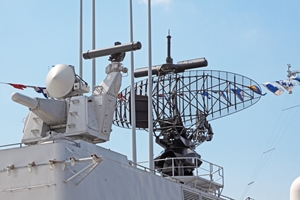While the U.S. Pacific Fleet gears up for a redistribution of its forces for future decades of focus on China, the first of a series of destroyers has quietly sailed into Spanish waters to establish a new line of American missile defense for Western Europe. Stars and Stripes reported that after a trans-Atlantic journey from Norfolk, Va., the first of four missile destroyers has arrived at Naval Station Rota in Spain.
A new missile defense system
According to the Navy, the USS Donald Cook is an Arleigh Burke-class missile destroyer equipped with Tomahawk and Harpoon missile launchers, two Vertical Launch Systems for hostile armament interception, Close-In-Weapons-Systems, and triple tube torpedo mounts.
That is just the first of four missile destroyers slated to comprise a new European missile defense system known as the European Phased Adaptive Approach. By 2016, all four ships will be based at Naval Station Rota on the Atlantic coast of Gibraltar. Combined with several land-based weapons systems in Romania, Poland and Turkey, commanding officials at Ramstein Air Base in Germany hope the missile defense shield will protect U.S. forces stationed in Europe and allies in the region from unseen threats from the Middle East.
When the naval force is fully deployed the Cook and its fellow destroyers will make four-month circuits throughout the Mediterranean Sea to monitor situations around the region.
A strategic initiative
The EPAA mission was announced by President Obama in 2009. Russian authorities claim the move will infringe upon their country's nuclear program, but U.S. officials disagree.
"To put it simply, our new missile defense architecture in Europe will provide stronger, smarter, and swifter defenses of American forces and America's Allies," Obama said in a press release. "It is more comprehensive than the previous program; it deploys capabilities that are proven and cost-effective; and it sustains and builds upon our commitment to protect the U.S. homeland against long-range ballistic missile threats; and it ensures and enhances the protection of all our NATO Allies."
A four phase plan that will reach completion sometime around 2020, the program has already resulted in tight military cooperation between the White House and European nations such as Poland, Romania and Turkey. Despite the claims of muted hostility from the Russian government, the 2010 Lisbon Summit of NATO allies commended the strategic initiative as a significant contribution to the region's military defense.

